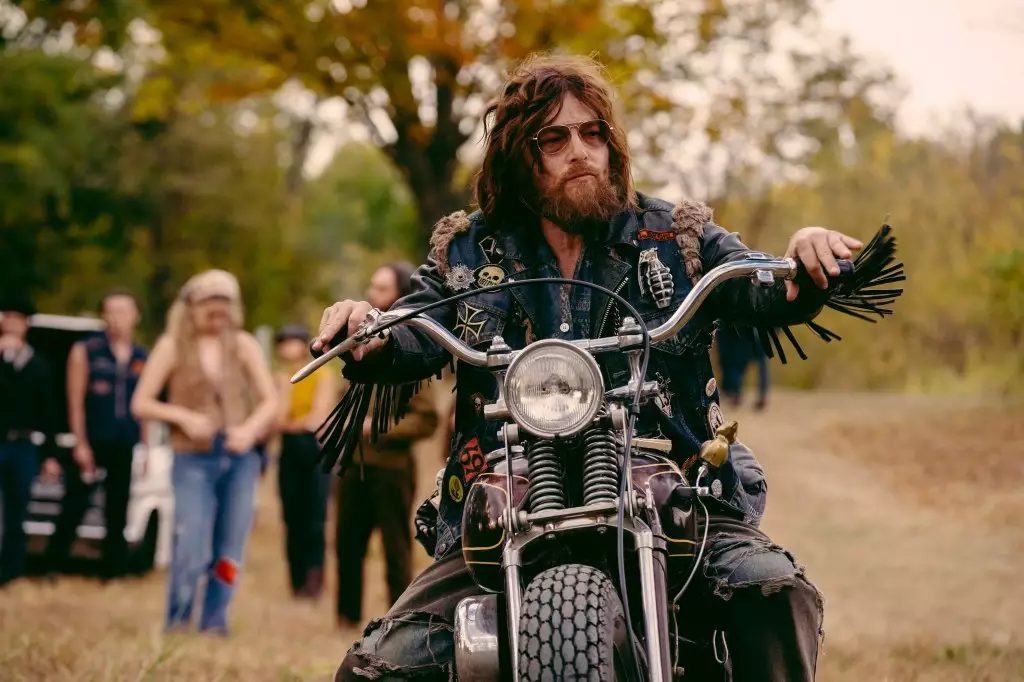Jeff Nichols’ latest film, The Bikeriders, presents a blend of true elements and fictional storytelling. The lineup of talented actors, including Austin Butler, Tom Hardy, Jodie Comer, Norman Reedus, Boyd Holbrook, and Toby Wallace, brings life to the characters that navigate the world of motorcycle clubs and camaraderie. The narrative centers around Butler’s character, Benny, a motorcycle enthusiast drawn to the Chicago Vandals, a group of bikers led by Hardy’s Johnny. While the film presents a sense of genuine connection and community within the biker culture, it also takes creative liberties in crafting its story.
The roots of The Bikeriders can be traced back to photojournalist Danny Lyon’s book of the same name. Lyon’s documentation of the Chicago Outlaws through photography and anecdotes served as the foundation for Nichols’ project. The film intricately weaves together elements from Lyon’s book, with characters like Johnny, Benny, and Kathy finding their counterparts in Butler, Hardy, and Comer, respectively. Nichols’ attention to detail, inspired by Lyon’s visual storytelling, manifests in the rich textures and nuances portrayed on screen.
While The Bikeriders draws inspiration from Lyon’s real-life accounts, it takes a departure into the realm of fiction to sculpt its narrative. The film’s interpretation of the Chicago Vandals, a tweaked version of the Chicago Outlaws, captures the spirit of the biker subculture while adapting certain aspects for cinematic effect. The shift in focus from documentary to drama allows for a deeper exploration of the characters and their relationships, offering a more nuanced perspective on the biker lifestyle.
Lyon’s exploration of the Chicago Outlaws in the 1960s offers a glimpse into a distinctive subculture that thrived on camaraderie and rebellion. The film mirrors this ethos by immersing viewers in the world of the Vandals, highlighting their rituals and gatherings. The dynamic between rival gangs, such as the Outlaws and the Hells Angels, adds a layer of tension and history to the narrative, showcasing the complexity of biker gang culture.
Danny Lyon’s decision to document the American biker experience in the 1960s reflects a journalistic curiosity that continues to resonate. His dedication to capturing the essence of the biker lifestyle serves as a testament to the power of storytelling through both visuals and narratives. By channeling Lyon’s spirit, Nichols pays homage to a pivotal moment in biker history while offering a fresh perspective on the timeless themes of brotherhood and freedom.
The depiction of the Chicago Vandals in The Bikeriders prompts reflection on the evolution of outlaw motorcycle gangs over the decades. From their roots in post-World War II America to their contemporary status as criminal enterprises, these groups have undergone significant transformations. While the ethos of brotherhood and rebellion persists, the context in which these gangs operate has shifted, highlighting the changing landscape of biker culture.
Overall, Jeff Nichols’ The Bikeriders stands as a testament to the enduring allure of the biker subculture. By blending elements of reality and fiction, the film offers a multifaceted exploration of camaraderie, rebellion, and the open road. Through the lens of characters like Benny, Johnny, and Kathy, audiences are invited to immerse themselves in a world where freedom and loyalty intersect, ultimately leaving them with a deeper appreciation for the complexities of biker culture.

Leave a Reply